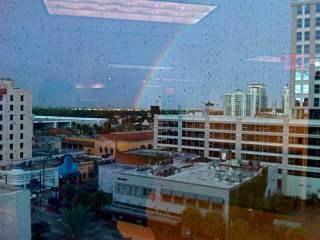Although south Florida’s rainy season has been officially over for a few weeks now, that doesn’t mean that we won’t get any more rain for the year. Far from it. After all, the “dry” season still has cold fronts pushing down from up north, and these are usually preceded by at least some measure of precipitation. And since we got a front just this week, courtesy of the late-season tropical storm Ida (the link will take you to the National Hurricane Center’s awesome graphic loop taking you through the storm’s wind history), I thought now would be a good time to share another Florida word of the day (FLWOD) with you all.
The picture is not from this week’s storm, but it does show the key ingredient, and today’s FLWOD: RAINDROP. That’s one word, not two. As with yesterday’s word, today’s word was gleaned from my day job reviewing copyediting for textbooks. And it’s particularly apropos* today, since just the other day we finally got a decent taste of cold-front, as opposed to tropical, raindrops falling on our heads. As I discovered recently, just because the heat generally stops around Halloween down here in south Florida, that doesn’t mean the cool air rushes in. The first ten days of November were marked by warm (mid-80s) days and warm (mid-70s) nights; we’ve been looking forward to the first “real” cold front of the dry season, and although this one doesn’t seem to be all that strong, it is at least a taste of things to come. (Despite the deliberately provocative title of my post, no one was fooled into predicting an early autumn by that foretaste of delightful cool we got in mid-October; one look at the calendar told us that it was too soon to hope back then.)
But Wednesday’s raindrops, Thursday’s cool weather, and the promise of lovely chilliness on Friday conspire to bring new hope to those of us down here who still miss the cool autumns of our youths.
Raindrops is an example of a compound word, formed from the separate words rain and drop (and confusingly set in the plural, with a singular verb, just to see who’s paying attention here!). The rules governing when compound words are spelled open (rain drop), as hyphenated compound (rain-drop), and as one word (raindrop) are complex. The Chicago Manual of Style calls this “probably the most common spelling question for writers and editors,” and advises that “the first place to look for answers is the dictionary” (CMS 15, p. 299, section 7.82). And that’s good advice.
CMS goes on to provide definitions of open, hyphenated, and closed compounds; they also point out that permanent compounds can be found in dictionaries, while the more troublesome ones, the temporary compounds, are “not normally found” in the dictionary. CMS, AMA, Garner, and even the unfussy CSE all agree, though, that hyphenation warrants careful attention by writers and editors.
An important point that some writers forget is that sometimes “the same word” is spelled both open and closed, depending on how it functions in the sentence (you knew that grammar would come back to haunt you!). For example, consider another word that could come in handy here in south Florida, at least during the summer rainy season: rainout. As a noun, it is a closed compound: “Today’s stroll was a rainout.” Like so many other compound words, though, it can also function as a phrasal verb, in which case it is spelled open, as two words: “Today’s stroll was rained out.” (Eric can tell you that we’ve used, or should have used, this phrasal verb a few times this year!)
Whether open or closed, though, any word having to do with rain is of vital importance here, as they are everywhere actually. The water supply for south Florida depends to a large extent on surface runoff, whether into the giant basin of Lake Okeechobee, deep under the ground in the Floridan aquifer, or near ground level, as with the surficial Biscayne aquifer. For more on this, you have to visit Robert Sobczak’s blog, the South Florida Watershed Journal; I will not reinvent the wheel here; all I’m trying to do is highlight the importance of raindrops to south Florida, and remind you to be careful when you spell the word.
Hope you enjoyed the post!
*Ironically, I’m always tempted to spell this particular word the French way, as two words, “a propos” (or, to be more correct, à propos)–another example of a two-word compound becoming one over the course of time!


There was a story this summer about the causes of distribution in raindrop size. I have a friend who is a cloud physicist and we’ve discussed this too many times while sitting in a car waiting out rainstorms in the desert (yes, somehow we always find the monsoon season).
I’m looking for a word that, if it exists, might be a compound word. It would be something like bittersweet that would describe an ecological relationship which has both mutualistic and parasitic qualities (or any combination of simultaneous good and bad aspects to an inter-species relationship)
Thanks for the links to the stories; the size of raindrops has always been a bit of a puzzle for me. Here in Florida, at least, the raindrops always seem to be fattest on the edges of the storm; when the storm gets more directly over you, it seems like the drops are smaller. I haven’t though of trying to quantify this, and without time and funding, doubt I’d be able to. But it does give me something to think about!